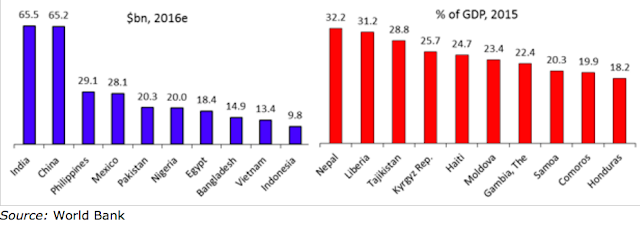PakAlumni Worldwide: The Global Social Network
The Global Social Network
Overseas Pakistanis Sent Home $20.5 Billion in 2016
Overseas Pakistanis sent home $20.5 billion in remittances in 2016, an increase of 5.1% over 2015, according to the World Bank. Pakistan's remittances are 7.5% of its 2015 GDP of $270 billion.
Pakistan's Declining Exports:
The increase in remittances from the diaspora is welcome news in Pakistan suffering from precipitous 12% decline of export earnings and gaping 35-year high trade deficit of $24 billion in 2016.
The World Bank report said 2016 remittances to India declined by 5% to $65.5 billion while Bangladesh received $14.9 billion, a decrease of 3.5% from the previous year.
Declining Remittances to South Asia:
Remittances to South Asia region as a whole declined by 2.3 percent in 2016, following a 1.6 percent decline in 2015. Remittances from the oil-rich GCC countries continued to decline due to lower oil prices and labor market ‘nationalization’ policies in Saudi Arabia, according to the report.
Top Recipients of Remittances:
The top recipients of remittances in 2016 are, India ($65.%b), China ($65.2b), the Philippines ($29.1b), Mexico ($28.1b) and Pakistan ($20.3b) and, in terms of remittances as a share of GDP, Nepal (32.2%), Liberia (31.%), Tajikistan (28.8%), Kyrgyz Republic (25.7%) and Haiti (24.7%).
Pakistan is not alone in seeing its exports decline amid weakness in world demand, particularly in Europe with its slowing economy. However, India's 2016 exports decline is much lower at 5.5% and India's trade deficit actually shrank.
Summary:
Increase in remittances to Pakistan is good news, especially amid declining worldwide remittances. However, Pakistan can not continue to count on remittances from overseas workers in the midst of low oil prices affecting the GCC nations where millions of Pakistanis work. It must take urgent steps to boost exports and lower its trade deficit to avoid yet another bill-of-payments crisis requiring yet another IMF bailout.
Related Links:
CPEC to Add Over 2 Million New Jobs in Pakistan
ADB Raises Pakistan GDP Growth Forecast
Is Pakistan Ready For War With India?
India's Israel Envy: Surgical Strikes in Pakistan?
Growing Middle Class in Pakistan
-
Comment by Riaz Haq on November 26, 2016 at 4:42pm
-
Global trade and capital flows flat or declining as globalization hits a wall.
Global capital flows:
http://www.economonitor.com/blog/2016/11/the-retreat-of-financial-g...
Peter McQuade and Martin Schmitz of the European Central Bank investigate the decline in capital flows between the pre-crisis period of 2005-06 and the post-crisis period of 2013-14. They report that total inflows in the post-crisis period reached about 50% of their pre-crisis levels in the advanced economies and about 80% in emerging market economies. The decline is particularly notable in the EU countries, where inflows fell to only about 25% of their previous level. The steepest declines occurred in the capital flows gathered in the “other investment” category.
Global trade flows:
https://www.bloomberg.com/view/articles/2016-11-15/what-it-will-tak...
This year has been full of news about the slowing or perhaps even end of globalization. The main evidence is that global trade volumes appear to have stopped rising, something that hardly ever happens outside of a recession. Still, if you step back a little, you can make a case that the globalization train is still chugging -- slowly -- along.
Last February, the McKinsey Global Institute put out a report on this rise of "digital globalization" and declared that:
Flows of physical goods and finance were the hallmarks of the 20th-century global economy, but today those flows have flattened or declined. Twenty-first-century globalization is increasingly defined by flows of data and information.
Comment
Twitter Feed
Live Traffic Feed
Sponsored Links
South Asia Investor Review
Investor Information Blog
Haq's Musings
Riaz Haq's Current Affairs Blog
Please Bookmark This Page!
Blog Posts
Pakistani Prosthetics Startup Aiding Gaza's Child Amputees
While the Israeli weapons supplied by the "civilized" West are destroying the lives and limbs of thousands of Gaza's innocent children, a Pakistani startup is trying to provide them with free custom-made prostheses, according to media reports. The Karachi-based startup Bioniks was founded in 2016 and has sold prosthetics that use AI and 3D scanning for custom designs. …
ContinuePosted by Riaz Haq on July 8, 2025 at 9:30pm
Indian Military Begins to Accept Its Losses in "Operation Sindoor" Against Pakistan
The Indian military leadership is finally beginning to slowly accept its losses in its unprovoked attack on Pakistan that it called "Operation Sindoor". It began with the May 31 Bloomberg interview of the Indian Chief of Defense Staff General Anil Chauhan in Singapore where he admitted losing Indian fighter aircraft to Pakistan in an aerial battle on May 7, 2025. General Chauhan further revealed that the Indian Air Force was grounded for two days after this loss. …
ContinuePosted by Riaz Haq on July 5, 2025 at 10:30am — 5 Comments
© 2025 Created by Riaz Haq.
Powered by
![]()

You need to be a member of PakAlumni Worldwide: The Global Social Network to add comments!
Join PakAlumni Worldwide: The Global Social Network